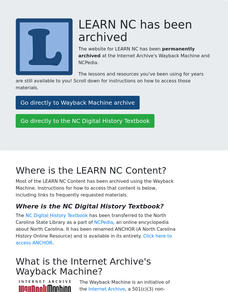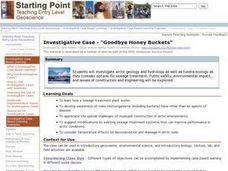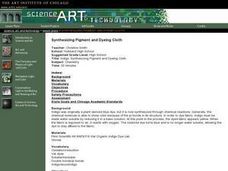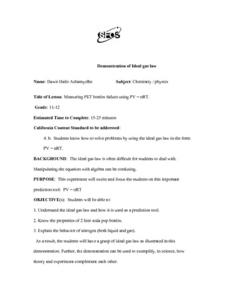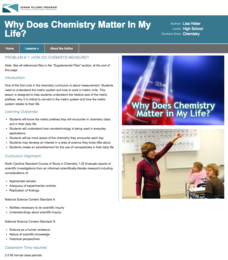American Chemical Society
Using Dissolving to Identify an Unknown
There is a solvent called aqua regis that can dissolve gold! After observing a solubility demonstration, groups receive four known crystals and one unknown. Based on the demo, they design an experiment to determine the identity of the...
Curated OER
Types of Chemical Reactions
Students conduct labs to gain an overview of chemical reactions. They observe examples of synthesis, decomposition, single displacement and double displacement reactions. They identify certain products by the use of litmus and splint tests.
Curated OER
Demonstrate Your Chemistry
Students research and evaluate chemical reaction demonstrations that are found on the web. they work in small groups to choose a demonstration that fits a particular category of reaction and then perform the demonstration for the class.
Curated OER
Chapter 10: Chemical Calculations and Chemical Equations
In this chemical equations worksheet, students write and balance chemical reactions. They complete 98 short answer and problem solving questions on molarity and chemical equations.
Curated OER
How Strong is the Solution
Learners investigate the strength of solutions. For this scientific inquiry lesson plan, students examine various solutions of food color and water as they discover the concentration of the solutions by adding bleach to clear the color.
Curated OER
Science Lesson Plans
Young scholars conduct a variety of exploration activities on various science topics. In this science lesson outline, students design a cell encapsulation to hold a specific type of medicine. They give examples of physical and chemical...
Curated OER
Identification of Animals by Serum Electrophoresis
Students compare their unknown serum against a set of known serum standards and determine the animal source of their serum. They write a lab report to communicate their results.
Curated OER
Icecream in a Baggie
Students apply their comprehension of colligative properties to real-world situations. They review the concepts of physical and chemical changes. Students are reminded that science is used extensively in food-production. They are...
Curated OER
Goodbye Honey Buckets
Students investigate arctic geology and hydrology as well as tundra ecology as they consider options for sewage treatment. Public safety, environmental impact, and issues of construction and engineering be explored.
Curated OER
The pH scale
Students list the common properties of acids and bases. They classify substances as acids or bases, by using pH and litmus tests and are able to explain the pH scale. They participate in a lab activity which reinforce their understanding.
Curated OER
Activity #17 Liquid Density and Temperature
Students comprehend that hot water rises up through cold water but cold water does not rixe in hot water. They comprehend that water at temperatures above 4oC decreases in density with increases in temperature. Students answer lab...
Curated OER
Determining Liquid Densities
Students practice determining liquid densities in a short, hands-on lab activity. Students use a graduated cylinder to measure out 100 milliliters of a liquid, find its mass using a balance, and record measurements in a data table....
Curated OER
Water Hardness- Causes and Testing
Eighth graders examine what materials cause water hardness and the relative measure of water hardness in a two part lab activity. In part one, 8th graders add an assigned soap test solution to eleven different test tube solutions in...
Curated OER
A Comparison of Polymeric Liquids with Newtonian Liquids
Students perform several tests on liquids. In this general science lesson plan, students compare the properties of polymeric and nonpolymeric liquids. They explain the composition and importance of macromolecules.
Curated OER
Water You Can Use from the Air Conditioner
Students work together to research water quantity, quality and safety standards. They complete a lab to discover how to use the water from an air conditioner. They write a paper to show their findings.
Curated OER
How Sweet It is! A Colorful Sugar Solution Density Column
Students examine the affect of density. Using a graduated cylinder and equally prepared volumes of sugar-water solutions and food color, students observe a sugar rainbow. They discover that the greater the amount of sugar in the...
Curated OER
THe Decomposition of Water
Students collaborate in an experiment where they decompose water into simpler substances through the process of electrolysis. They collect, measure, and observe data and then place the data into a table. Accomodations for students with...
Curated OER
Synthesizing Pigment and Dyeing Cloth
Students create a synthetic dye and oxidize the dye and record the effects.
Curated OER
Chemical Disasters
Students discuss the importance of safety in the science lab and also in industry. They also will understand some of the implications of chemistry in the world using links provided.
Curated OER
Demonstration of Ideal Gas Law
You know that liquid nitrogen turns into a gas at room temperature. Place some in a two-liter bottle for a physics demonstration of the ideal gas law. Beware, however; this is a dangerous demonstration! Not to mention that you may not...
Kenan Fellows
How Do Chemists Measure?
Young chemists create gold nanoparticles as they learn to measure accurately with the metric system. They create an advertisement for the application of nanotechnology to complete the first lesson in a series of six.
Curated OER
Making Soap
Students explore what chemical indicators are and use pH paper to determine if something is alkaline or basic. In this pH lesson students manufacture their own soap.
Curated OER
Ice
Students examine the different propereties of ice, such as freezing temperature. In this scientific lesson students complete several activities using ice, like making ice cream.
Curated OER
Using Newsprint as a UV Detector
Middle schoolers investigate the effects of UV radiation. In this earth science lesson, students explain how the time of day relate to UV abundance on Earth. They determine if weather affects the amount of UV that Earth receives.



